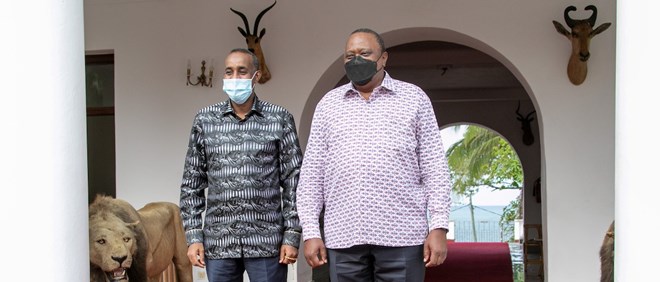
Saturday September 25, 2021
BY MOHAMED GAAS
Somalia’s volatile internal politics make reconciliation with Kenya in the immediate future unlikely.

Photo: PSCU/Twitter
Kenya and Somalia share cultural and economic ties and common security interests which, if balanced, could benefit both countries and the Horn of Africa region. But the two states have had a turbulent relationship, and despite recent progress, rebuilding ties will be difficult until Somalia achieves some measure of political stability.
Several meetings in recent months aimed to restore diplomatic relations, which have reached a low point in the past few years. In May, three days after Kenya suspended all flights to and from Somalia, the countries’ leaders met at President Ismail Omar Gelle’s inauguration in Djibouti and again recently in London.
On 10 August, Somalia’s Prime Minister Mohamed Hussein Roble travelled to Mombasa for talks with Kenyan President Uhuru Kenyatta and senior government officials. At the end of the meeting, they agreed to strengthen trade, people-to-people ties and movement, and collaborate on regional and international issues.
This positive development is generating a political mood among leaders in both countries for a rapprochement. It is fuelled by the need to stabilise ties and revitalise the ministerial technical committee for collaboration established by both states in 2015. The committee failed to take off due to constant disagreements between the countries, culminating in both their ambassadors and severing ties until recently.
But will the latest steps deliver long-term results? Many Somali analysts believe that while Roble genuinely wants to rekindle relations with Kenya, his move may be part of a wider strategy to realign Somalia’s ties with Kenya, the United Arab Emirates (UAE), Saudi Arabia and Egypt. This would boost his position in relation to his political rivals in President Mohamed Abdullahi Mohamed’s (Farmaajo’s) camp.
Given the deep divisions in Somalia’s political leadership, the success of the rapprochement will probably depend on both internal and external factors. Internally, there’s the unresolved maritime border dispute between the two – despite the case being deliberated by the International Court of Justice (ICJ) for the past seven years. Kenya prefers an out-of-court settlement while Somalia wants an ICJ resolution. The court is expected to rule next month.
These opposing positions will be hard to reconcile. The maritime case has become a highly sensitive public issue in both countries, and backing down would be political suicide for any aspiring or current leader in Somalia.
The case could also destabilise Somalia by strengthening al-Shabaab’s narrative that government leaders are puppets of foreign states and entities who act outside of the country’s interests. Analysts speculate that war could break out on the maritime issue. This seems unlikely, though, considering that since the United Nations Convention on the Law of the Sea was signed in 1982, there have been more than 200 maritime border disputes, and none have resulted in war so far.
Whether the warming of relations bears fruit will also depend on the immediate resolution of several other disagreements over Somalia’s election modalities, its conduct in the polls and its outcome. Given the stalemate within the country on these questions, a resolution in the short term seems unlikely.
Election-related issues combined with the timing of the rapprochement could deepen mistrust between the Somali president and his allies on the one hand, and Roble and his opposition associates on the other. There is little tangible progress to suggest that the deadlock between the prime minister, opposition and president will be broken anytime soon. Just last week, Farmaajo issued a decree limiting some of Roble’s powers after the prime minister had fired several allies of the president.
A further delay of Somalia’s election is likely. The president and his allies who lead Galmudug, Hirshabelle and South-West states are determined to keep Farmaajo in power at any cost. This could explain the disagreement between the president and former prime minister Hassan Ali Khaire that ended with the latter being fired after a vote of no confidence in Parliament.
It could also be why Roble is trying to realign Somalia with Kenya and Egypt, the UAE, Saudi Arabia and Sudan. In contrast to Farmaajo and his supporters, transparent elections are favoured by Puntland and Jubaland, along with Roble, the opposition, prominent individuals in Somali society and civil society.
Attempts by the rival political camps to solidify their positions could draw in external actors. Ethiopia, Eritrea, Qatar, Turkey and possibly Iran would probably side with Farmaajo while Egypt, Kenya, the UAE and some in the wider international community could support Roble. If tensions are left to escalate, violent conflicts between the two groups could break out.
In the interest of stability in Somalia and the region, unwarranted interventions by international actors, including Kenya, in Somalia’s election must be avoided, as that could ignite violence. It would also legitimise al-Shabaab’s accusations of foreign interference in a sovereign state. Political stability in post-election Somalia is crucial to degrading the extremist group and enhancing security in the region.
The Horn of Africa’s history shows that crises in one country can ignite conflicts and violence in others in the region. Somalia’s internal politics are currently much too volatile to enable good relations with its neighbours.
Once elections have taken place, Somalia and Kenya can engage in building relations and trust gradually. Until then, external actors should avoid direct involvement in Somalia’s polls, as that will neither facilitate the voting process nor help stabilise the country and the region.
Mohamed Gaas, Senior Researcher, Horn of Africa Security and Analysis, ISS